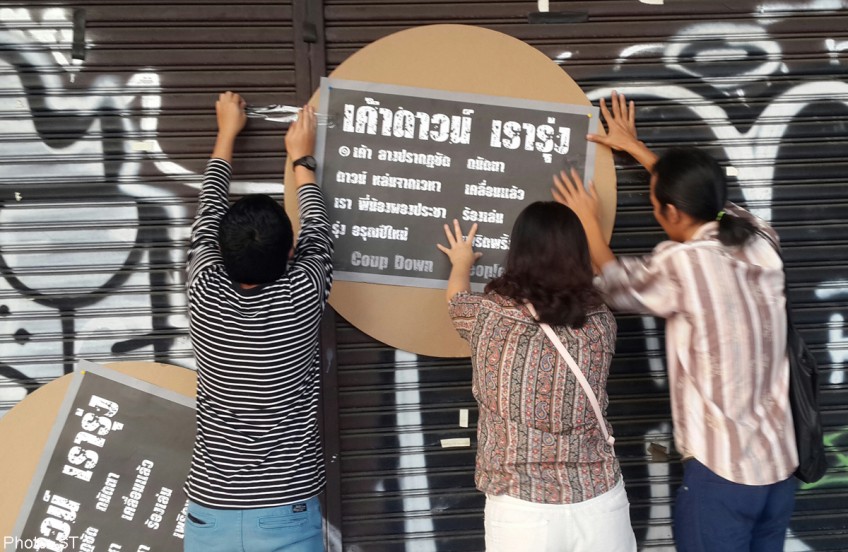Will ripples of dissent in Thailand turn tidal?

It was labelled a New Year's Eve street party, but it fooled no one.
On Wednesday evening, dozens of police, army and plainclothes officers kept a close watch as 50-odd people spread sheets to sit on on the sidewalk facing Democracy Monument, a Bangkok landmark and focus of many political events through the decades.
The police insisted that those staging the street event should not criticise Thailand's military regime and not give the three-finger salute from the popular Hunger Games movies that has been turned into a sign of dissent against the military. In return, they would be left in peace.
As the military regime, which took power in a coup last May, indicates that elections may be delayed, and the royal succession looms as King Bhumibol Adulyadej, 87, grows more frail, there is an undercurrent of dissatisfaction with the idea of extended military rule, as shown by the street event.
And it is not limited to disenchanted peasants or disgruntled politicians. Among the group on the sidewalk were students, a lawyer, a musician from a band which performs political songs, small businessmen and professionals, as well as a handful of lecturers from universities in Bangkok.
Whether such pockets of dissent will morph into something larger, and if so how long that will take, is a critical question.
Another question is whether dissent against extended military rule will render outdated the simplistic "red-yellow" narrative of rural poor vs urban royalist elites that serves as shorthand for Thailand's epochal political conflict, as people from both sides find common cause.
Yellow represents loyalty to the King. Red is the colour adopted by the movement of mainly rural folk against the royalist-military-bureaucratic elites.
In a recent series examining the ideals and roles of student groups around the country, the online journal Prachatai remarked that "student activists of various political orientations (have begun) once again to voice opposition to the suppression by the junta".
It added: "Although these new student movements are not mass youth movements affiliated with political ideologies as in the 1970s, neither are they affiliated with the current colour-coded political divide in Thailand."
Whether the dissent will snowball depends on whether the military shows signs of staying in power, and if the economy continues to be in the doldrums.
The economy grew between 0.8 per cent and 1.5 per cent last year; it is forecast to recover to about 4 per cent this year, but most analysts remain gloomy, citing political uncertainty and an export sector hit by changes in the world markets.
The regime initially signalled that an election would take place towards the end of this year; in recent weeks that schedule has been pushed back to early 2016.
"Dissent will pick up in 2015 if people start believing the election will be delayed," said one activist at the street event, asking not to be identified.
A human rights analyst, who also asked not to be named, said: "The state of the economy will be the trigger for the middle and upper class. If it is really bad, they will turn against the army."
There are some similarities between groups holding small symbolic protests that have taken place since the May coup and the small groups of pro-democracy activists that emerged in the aftermath of the 2006 coup d'etat which overthrew then Prime Minister Thaksin Shinawatra.
But some believe there is some way to go before these groups can grow large enough or coherent enough to threaten the military. In an interview from an undisclosed location outside Thailand, where she fled to after the May coup, red-shirt supporter and former Chulalongkorn University lecturer Suda Rangkupan said: "Most of the young today care more about their own freedom.
"I don't believe Hunger Games heroines can wake up the majority of them. Not yet."
nirmal@sph.com.sg

This article was first published on Jan 3, 2015.
Get a copy of The Straits Times or go to straitstimes.com for more stories.